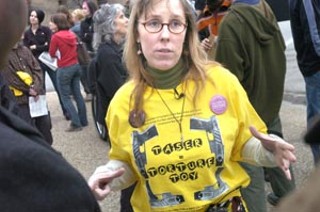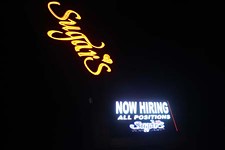New Austin 'Spokes' Speak Out Against Tasers
Austin activists coordinate efforts on police tactics, war, and other issues
By Diana Welch, Fri., Feb. 18, 2005

Last Friday, about 70 people gathered in front of the Austin Police Department headquarters to protest police use of "Tasers" – a brand name for dart-firing electro-shock weapons designed to cause instant incapacitation by delivering 50,000 volts into the body. (Tasers can also be used at close range as a contact weapon, in the manner of a "stun gun" or cattle prod.) When they were first introduced a few years ago, Tasers were regarded a suitable nonlethal alternative to guns – and the APD's departmentwide adoption of the weapons was partly in response to recent officer-involved shootings. But there has been growing concern, locally and nationally, over the indiscriminate use of the weapons, most recently against demonstrators in public protests or against people simply not responding immediately to police orders. (Amnesty International argues that Tasers lend themselves to "excessive and lethal force," as there is no technical limit to how many times the user can deploy the instrument.)
"Even though there have been 80 deaths in North America the last four years [attributed to Tasers, according to AI], Austin sees fit to buy [a Taser] for every single cop in the city," said Debbie Russell, who, along with fellow members of the Austin Spokescouncil, organized Friday's demonstration. Tasers "are supposed to be nonlethal weapons? No." Russell has been in the forefront of the Spokescouncil's latest campaign, calling attention to the issue with two appearances before the City Council. "One of the themes of all of our actions has been [opposing] torture for profit," she notes. "It's all about our public money going towards these private entities so that they can profit off of abusing human rights."
Since its inception a year ago, the Spokescouncil (or just "Spokes," as members often refer to themselves) says the group has organized most of the public actions made to draw attention to the anti-Iraq-war movement, including pickets at various private contractors (CACI International and Computer Sciences Corporation among them), the "Day of Wailing" to mourn Iraqi casualties, a Bikes Against Bush rally, the Day of Resistance Against War and All Who Profit From It (last Sept. 11), and the J20 Anti-Inaugural March – where, they say, a protester was unnecessarily Tasered by police. "I feel like the mobilizations we've been doing are a bit more exciting than going to the Capitol and listening to some college professor drone on and on until you cry," laughs Jerry Bellow, a veteran activist who has worked with the Anti-Racist Action group for the past 11 years. "Every action that we've done has had double the numbers – or more – of the previous one."
What started as a call for an emergency spokescouncil by the ARA to organize in reaction to the U.S. soldiers' abuse of prisoners at Abu Ghraib prison in Iraq has become a full-fledged matrix of organizing for Austin's activist community. A recent Spokes meeting included representatives of Austin Against War, CodePink, the ARA, the ACLU, the Rhizome Collective, Resurgent Tide, Food Not Bombs, the fledgling UT anti-war group Campus Antiwar Movement to End the Occupation, and local high schools Garza and McCallum – quite a range in a community commonly considered to be somewhat scattered. "Up until this past year, I would go to a different meeting every night, just trying to keep all the groups connected," recalls Russell, who represents CodePink and the ACLU at Spokes meetings.
Inspired by the spokes of a wheel, a spokescouncil is made up of several small, tightly knit groups called affinity groups, who choose one representative, or "spoke," to sit in front of them in a circle of other spokes; the hope being that, with fewer voices clamoring for the floor, a more cohesive organizational unit will ensue, producing more effective actions. "We're trying to negate hierarchies where one person tells everybody what to do," explains Spokes member Aaron Lozier. "It's important that [people are] not shut out due to majority rule or the rule of a few."
Russell has been active in several Austin activist groups, and said Austin Against War, a group from whom she recently broke (although the group is still represented at Spokes meetings), is an example of the failure of the "majority rules" model. "After dying over and over again, [AAW has] been existing in this sort of zombie state for over a year now. People stack meetings by bringing 10 people from their group to vote on a certain action. And people get discouraged because their voices aren't being heard," she said. "It's just not a sustainable model. The occupation [of Iraq] is here to stay, so we have to create something that is workable and sustainable."
While the anti-Taser campaign has been the group's recent focus, the Spokes are maintaining their anti-war efforts. They are currently planning actions for both March and May. "The only thing that will stop an unjust war is people interfering with it," says Bellow, who credits his experience physically dismantling white-supremacist groups for his dogged belief in the people's power. "The disruption doesn't have to be violent," adds Lozier, who cites as inspiration the Danish resistance to the Nazis in World War II. "Through massive civil disobedience and stopping production, they just made it not worth it to [the Nazis]. We need to do the same thing with the war: Make it not worth it."
Got something to say on the subject? Send a letter to the editor.








